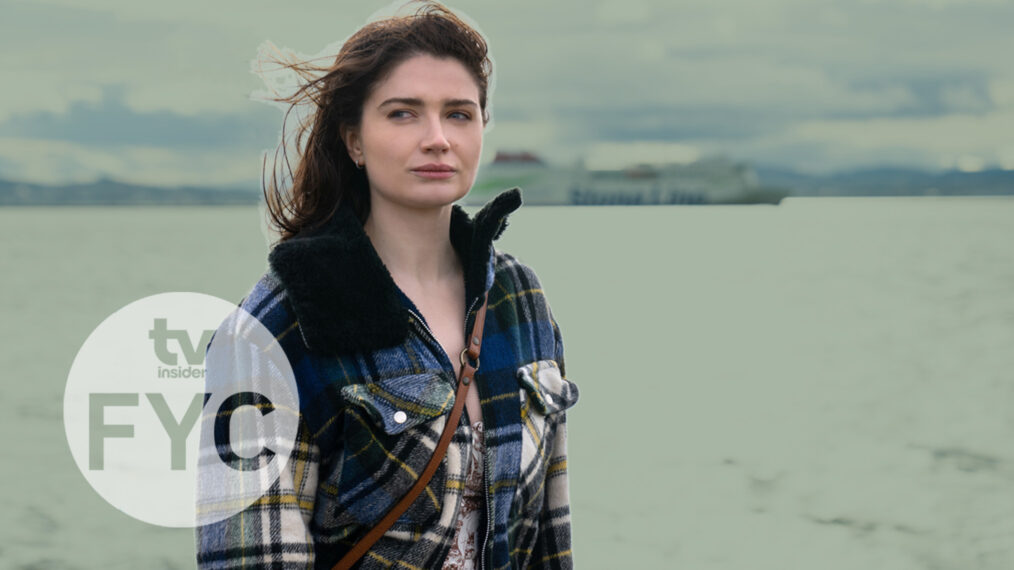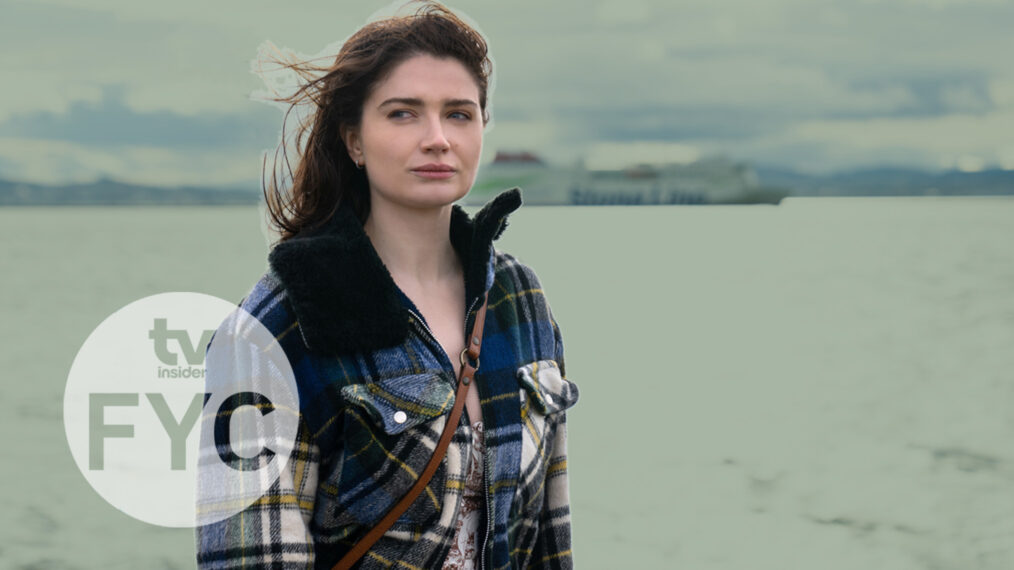
If your sister was being abused by her husband, what would you do? For Bad Sisters‘ Garvey siblings, the answer was simple. But killing their brother-in-law proved more difficult than they expected, not that they ever thought it’d be a walk in the park.
Eve Hewson plays the youngest of the five sisters, Becka Garvey. The women were raised by eldest sister Eva (Sharon Horgan, who also created and wrote the series) after the deaths of their parents years prior. Becka is the first to volunteer to kill J.P. (Claes Bang), but through two timelines and many failed murder attempts, J.P.’s killer remains a mystery until the final episode.
The Apple TV+ dark comedy will be back for Season 2. Here, Hewson shares how she, Horgan, Anne-Marie Duff (Grace), Eva Birthistle (Ursula), and Sarah Greene (Bibi) made the Garvey sisters’ closeness so believable, what to expect in Season 2, and why she feels Becka was the role of a lifetime.
The Garvey sisters’ dynamic is the heart of the story. How did you five build that closeness?
Eve Hewson: It’s very distinctive in the script the way that Sharon writes. And Sharon comes from a very big Irish family, as you can tell, so it’s really authentic anyway on the page. The banter between us, the love between us, the different sort of alliances, it was there on the page, and then all the sisters are so great. We genuinely do love each other.
When we started, we were in the middle of COVID, and we were going to do a table read together. Then certain people had gotten COVID, or there were close contacts, whatever, so we ended up doing a table read on Zoom. And I remember going, “Wow, the chemistry between the sisters is there, even on Zoom?” If it’s there on Zoom, we’re good. Then we did about two weeks of rehearsals, which I loved and wish we did more of, where we all just sat around the table, the main cast, and read through the scripts.
We were doing 100 different table reads, and we managed to find a pace and a tone and a familiarity with each other that I think really carried through. It was great to be able to watch each other work and watch each other’s scenes and just sort of form a bond there. We had fun, you know? It was a good time. And then after spending 10 months shooting with each other, you do end up becoming family anyway.
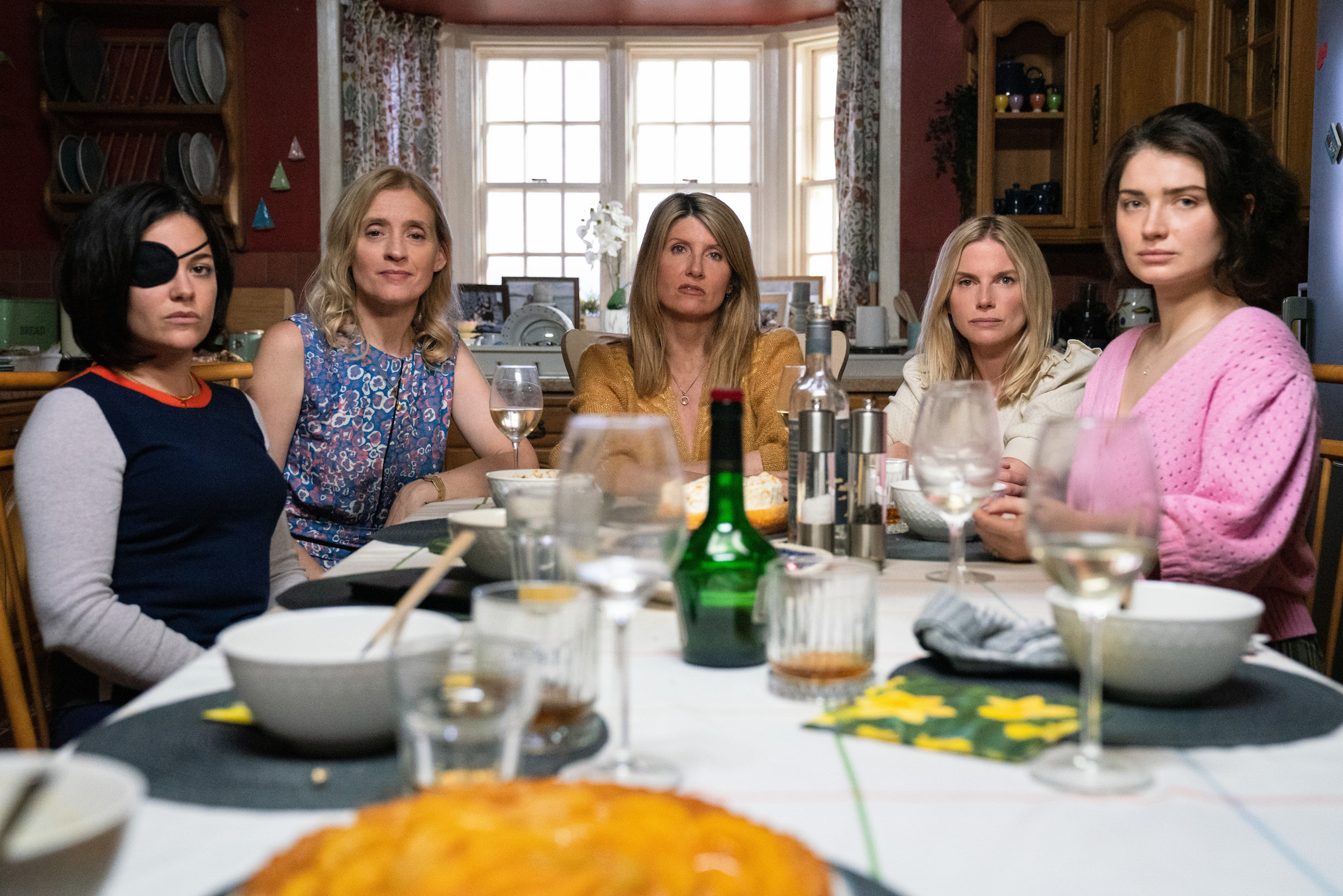
Apple TV+
It sounds like you got a little more of a theatrical experience than TV usually gets to be.
Yeah! I used to hate table reads; I used to be really scared of them. And now I’m like, oh, no, we have to do table reads. It’s essential — especially with this, because it’s comedy and it’s drama. There’s such a specific tone. It was important for all of us to hear it and to understand.
Nailing the specific tone for this story seems especially important, because you have to make the viewers believe that you all are right to murder someone.
Yeah, exactly.
You have to have a very likable and fully rounded bunch to be able to pull that off, even though it’s not that hard to hate J.P., let’s be honest.
It’s true. [Laughs]
How was the role of Becka pitched to you, and what made you want to take it on?
It was just an audition. I think I was sent the first episode and I put myself on tape, but then I did a chemistry read with Sharon, then I got the job. It was a good six months before we shot as well because of COVID, so I was sort of walking around London thinking about Becka for a really long time, dying to get back to work and dying to play this part.
I just connected to her in a way that I’ve never fully connected with other characters that I’ve played. Usually, I play characters that are very unlike me. Becka felt so close to my heart. She was so like me growing up, or my friends growing up in Dublin, people like my babysitters and all of the people that I was around that raised me. It meant a lot to me to play her.
I was scared because you never know if you’re gonna get the job, but I just felt like I had to play her. It was one of those once-in-a-lifetime moments where I’d imagined playing a character like her but I never, ever, ever read a character like her. I felt like I was in the right place at the right time, and I was really lucky to be in that spot.
What about Becka felt so familiar? What of yourself did you see in her?
Her humor, her charm — all of that is so quintessentially Irish. I think we all have this, but I think as an actor, it’s sort of more pronounced, but that feeling of failure or being lost or not knowing what’s going to happen next, I connected with that. There’s a part of me that feels that way.
I was turning 30 when we started the show, and she’s so hectic. She’s just so clearly a girl in her 20s trying to figure it out. I had just gone through that decade of my life and was kind of processing it and ready to move into a new decade. And so in a way, I could sort of embrace all of those feelings of making mistakes, put it all in Becka, and then say goodbye to it.
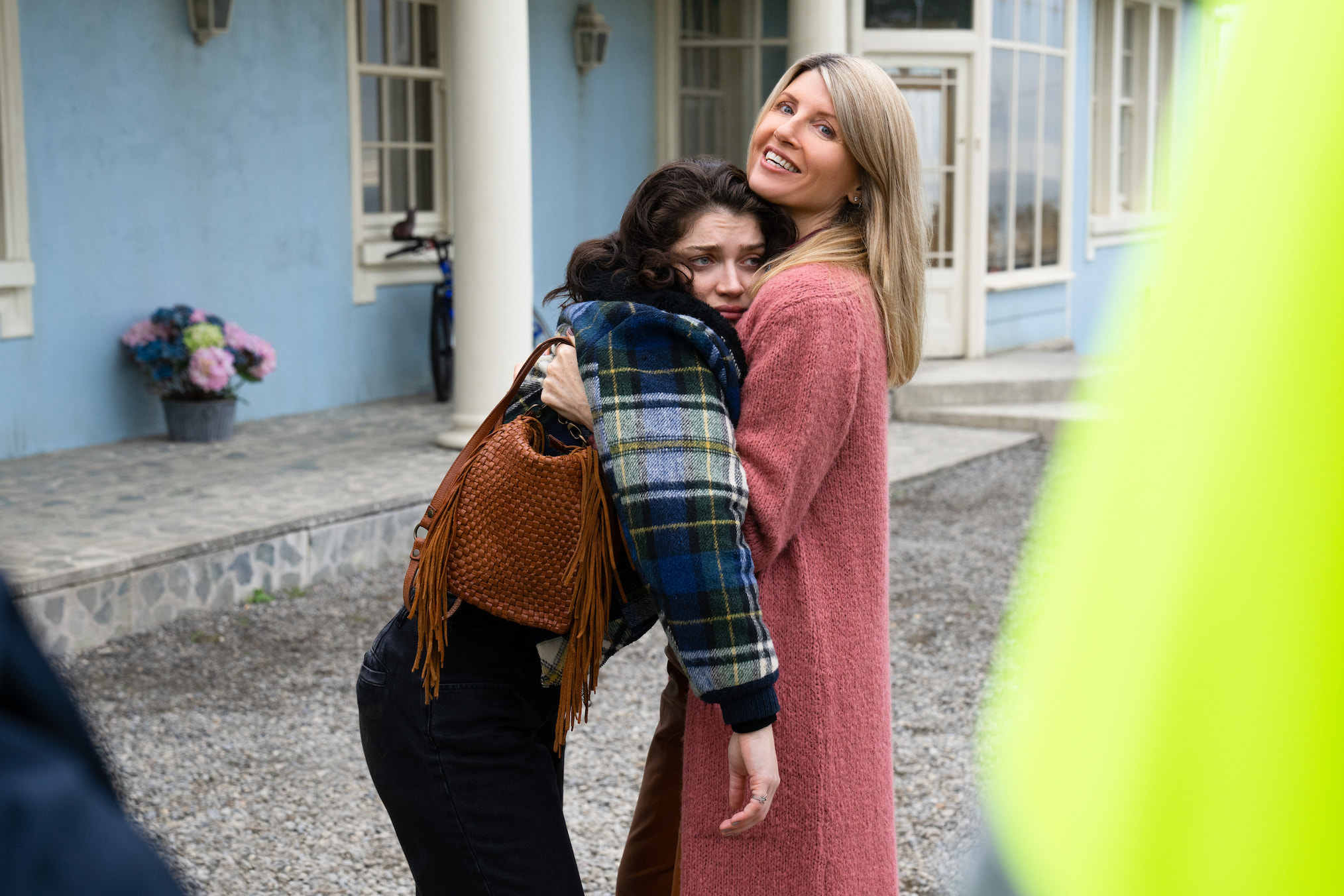
Apple TV+
Eva’s the de facto mom of the group, but I feel that’s especially the case with her and Becka. Was that closeness apparent between you and Sharon from the start?
Yeah, I think so. Sharon’s truly just a wonderful person. I look up to her as an older sister in a sense. Watching her do her work, it’s an incredible education to see someone be so committed to what they’re doing and so engaged. Not a second goes by where she’s taking a break. She walks into the makeup trailer, and she’s writing on her laptop from the moment she’s there. She works, works, works all day long, and I was so inspired by that. I adore her, and I definitely brought that into Becka and the relationship. We ended up really feeling like sisters … and I think that transferred on screen.
There’s been a lot of shows in recent years about Irish culture, families, friends. There’s Bad Sisters, Derry Girls, Normal People, Conversations With Friends. What do you think is the appeal of Irish culture?
Our trade is storytelling. We’ve always been great storytellers, and we’ve also always had a very strong sense of our culture and our music and poetry and literature. We’re also a lot of fun. I think one thing about Irish people is that we never really feel sorry for ourselves. We don’t take ourselves too seriously. We don’t wallow in our pity, and yet I think we’re quite dramatic. There’s something about that kind of character that I think is interesting on TV and film, in theater, whatever it is.
Obviously, I’m biased, but [Irish people] are my favorite people in the world, and so I’ve always thought we were really interesting and worthy of a global appeal. But it’s amazing that in the last few years [there have been more Irish stories]. And I really think it was Normal People that kicked it off. I think we’ve always been making great art, but TV has allowed us to tell different types of stories. And with Bad Sisters, it was sort of the first time that you saw a middle class, kind of modern-day family in Ireland that felt so relatable to Irish people now but also I guess to America.
I’m really proud. It’s a special moment that’s happening, and it’s not just stories about farmers and nuns. [Laughs] We’ve got many different characters and many different cultures within our island, so I’m really, really proud of it.
Bad Sisters shows a different side of domestic abuse than we typically see on TV and in movies. It shows how an abuser manipulates their partner into isolation but also how the abuse bleeds out onto everyone. Why do you think that’s important to show?
Oh, God, it’s really important. I haven’t seen every show out there that’s about this, but what I like about our show is that it’s got such a dark, strong, important story to tell, but it’s set in a world that feels very familiar. It feels accessible, it feels true and authentic to everyday life. The kind of jarring part of it is that, wow, this is really happening to regular people every day, and it’s not just a more heightened, more intense, more dramatized version of it. Life can be funny, and it can be sad, and it can be beautiful, and it can be really f**king difficult, and I think that our show captures that.
It’s why audiences were drawn to it, because we’re saying something that really matters. We’re trying to tell a story that really matters, but we’re also not exhausting the viewer and traumatizing the viewer too much that it’s unwatchable. In a way, it has more power, because it’s also very entertaining, it makes you laugh, and it makes you giggle at times. It’s easier, I guess, to digest the reality of the domestic abuse in the storyline because of that.
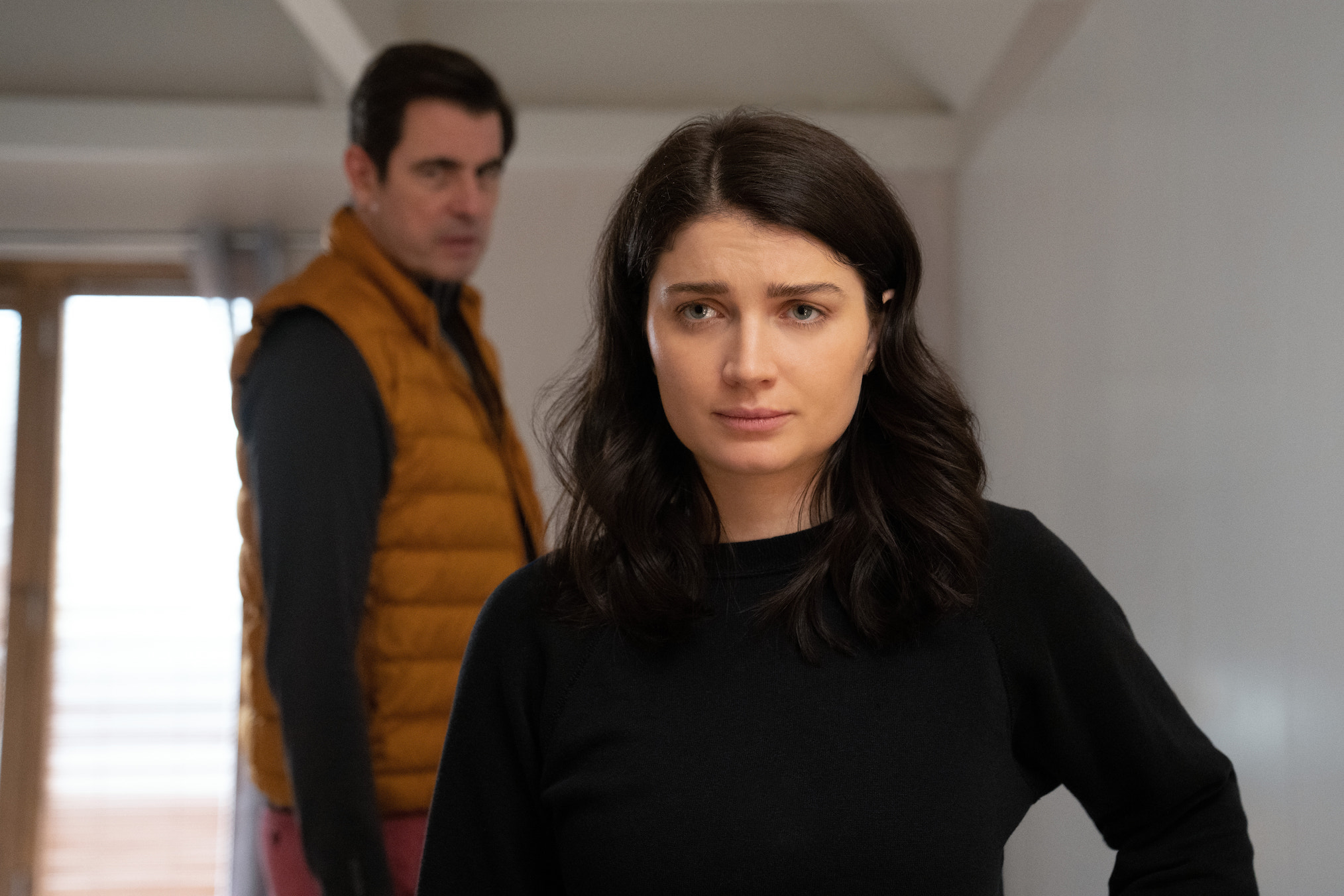
Apple TV+
What I love about Becka is that her big feelings are so on the surface. There’s a delicateness to her, and yet she’s willing to kill someone. I feel like there’s a connection between how deeply she cares for people, how raw those feelings are, and her willingness to act on them in extreme ways. Would you agree?
Absolutely. She is open and trusting and wears her heart on her sleeve, because I think she’s constantly looking for that love she didn’t get from her parents. Their parents passed when she was like 2 or 3. That sort of welcoming of people and inviting people into her life and trusting people, that’s all her are trying to fill up her broken heart, and it becomes especially heartbreaking when she trusts J.P. and he screws her over. You see the wheels start to turn and her start to look at the world in a different way. And then the choices she makes because of that end up breaking her even further.
I loved playing that character, even though it was really hard to do emotionally. There were a lot of days where I would come home and it was a difficult mindset to be in, to be that open and that vulnerable. But, you know, she feels like a real person. I know so many people like that. She has so many different facets to her, like the fact that she is the baby and the fun one, but then she’s also into psycho murder and gets really invested in it. [Laughs] I love playing characters that have a broad spectrum of personality. She’s many different people in that one person.
I think all the sisters get to this point, but Becka seems to especially believe that J.P. has to die. It’s like it’s common sense for her, and I think the show does a great job of making that so clear to the viewer. It’s like “Earl had to die,” you know?
Yes, totally. It’s that strength of family. Truly, if it was happening to one of my siblings or a parent or anything, you would feel that intense anger. I’m saying I would kill someone [Laughs]. But wanting to protect your family member — I think that’s even stronger for [the Garvey sisters] because they don’t have their parents and they’ve gone through grief. They’ve had to be this unit, and they really have to protect their unit.
And the stakes are even higher because he’s traumatized all of them. It’s not just that he’s come for the one of their own. He’s come for all of them.
Yeah, he’s tearing people apart. He’s destroying them.
I’m so intrigued to see where this could go next, since the big mystery is solved in the Season 1 finale. Can you give any hint of what’s to come in Season 2?
To be perfectly honest, I really don’t know. I know a few little things from what I’m getting. The show is true to life, like authentic to the reality of life in a sense. If this really did happen, if a family really were involved in this, and if Grace really did this, those consequences wouldn’t go away completely after the season ends, the murder’s over.
If you think about like that show Bloodline, how it sort of carried on and how there’s consequences to these things, I think that’s where we’re going to take it. It’s going to still feel like real life, and then it’s also going to have the joy and the fun and the ridiculousness. It’s not going to be like we kill a prick every season. [Laughs] It’s not going to be like that. We won’t do that to you. But I think we’re gonna see the sisters trying to deal with the consequences of what happened last season.
Bad Sisters, Season 1, Streaming Now, Apple TV+

